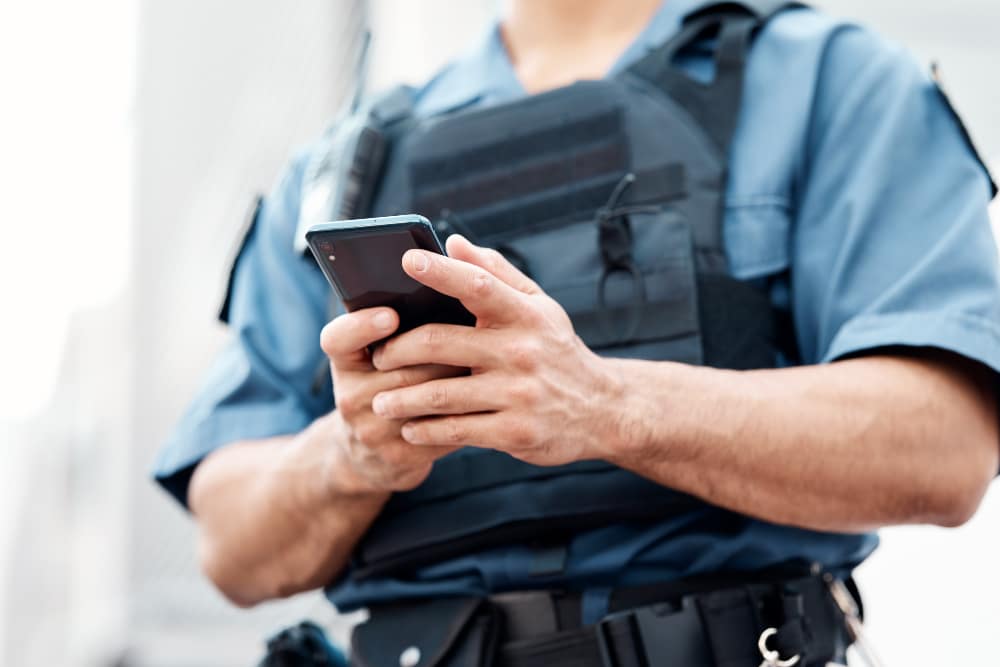Cellphones are everything in today’s digital age. Smartphones contain vast amounts of personal data, sensitive information, and for some—incriminating evidence that may be used against them in a federal investigation. This can include evidence related to criminal activity or possession of illegal content on one’s electronic device. It is important to understand your rights if your cellphone is seized by federal law enforcement, including how to keep authorities out of your device and how to fight to get it back.
Legal Basis for a Federal Cellphone Seizure
Federal law enforcement can seize your cellphone with or without a warrant under several circumstances:
With a warrant:
Federal authorities are allowed to seize your cellphone and examine its contents when they have a valid warrant issued by a judge to do so. Such a warrant must be detailed in nature, include a probable cause statement to justify the search and seizure, and identify the specific information sought within the device to be searched. If authorities exceed the scope of the warrant, the search may be considered unconstitutional and the evidence obtained may be inadmissible in court.
Without a warrant:
Generally, federal authorities are not allowed to seize and search your cellphone without a warrant, with a few exceptions:
Consent:
If you voluntarily provide access to your cellphone and give authorities permission to search it;
Search Subject to Arrest:
If you are lawfully arrested your cellphone may be seized subject to arrest, but generally, authorities still need a warrant to search the contents within your device.
In Riley v. California, 573 U.S. 373 (2014), the U.S. Supreme Court held that “searches subject to an arrest must be limited to the area within the arrestee’s immediate control, where it is justified by the interests in officer safety and in preventing evidence destruction. A search of digital information on a cell phone implicates substantially greater individual privacy interests than a brief physical search; data stored on a cell phone cannot itself be used as a weapon to harm an arresting officer or to effectuate an escape. To the extent that a search of cell phone data might warn officers of an impending danger, such a concern is better addressed under case-specific exceptions to the warrant requirement, such as exigent circumstances.”
Riley v. California | 573 U.S. 373 (2014) | Justia U.S. Supreme Court Center
Exigent Circumstances:
Under extremely limited circumstances, authorities may search your cellphone without a warrant if they in good faith believe there is an immediate threat that requires a warrantless search (e.g., to stop one’s escape, to protect life, or to prevent the imminent destruction of evidence within the device).
Border Searches:
U.S. Customs and Border Protection can generally search electronic devices, including cellphones, at international ports of entry without a warrant or probable cause due to the “border search exception” to the 4th Amendment. This exception allows for “routine” inspections and searches at the border. The scope of the warrantless search must be limited, however, and a more intrusive search of one’s cellphone may require additional justification depending on the specific circumstances surrounding the search and federal jurisdiction.
For more information about border searches at international ports of entry, check out: Border Search of Electronic Devices at Ports of Entry | U.S. Customs and Border Protection
Federal Legal Defenses Against Unlawful Cellphone Seizure
If your cellphone was taken by federal law enforcement without a warrant or exception, it is important to contact a federal criminal defense attorney right away to discuss your rights and challenge the seizure based on the following:
Fourth Amendment Protections:
The Fourth Amendment of the U.S. Constitution states that, “[t]he right of the people to be secure in their persons, houses, papers, and effects, against unreasonable searches and seizures, shall not be violated, and no Warrants shall issue, but upon probable cause, supported by Oath or affirmation, and particularly describing the place to be searched, and the persons or things to be seized.”
This includes your cellphone. Your attorney may be able to file a motion to suppress any evidence obtained from your cellphone if they believe the search/seizure was unlawful and your Fourth Amendment rights were violated.
Federal Privacy Protections:
In today’s world people use their cellphones for everything—from social media, contact information, GPS navigation, banking, shopping, work, school, personal record keeping—the list is endless. U.S. federal courts have recognized that electronic devices (such as your cellphone or computer) contain far more private data and information than tangible objects (such as your wallet or car). For this reason, federal cellphone searches must be limited in scope and narrowly tailored to the specific information authorized to be searched in the warrant application. The U.S. Supreme Court has repeatedly held that the “Fourth Amendment protects not only property interests but certain expectations of privacy” such as the information contained within one’s cellphone.
Carpenter v. United States | 585 U.S. ___ (2018) | Justia U.S. Supreme Court Center
Your attorney may be able to file a motion to suppress any evidence obtained from your cellphone if they believe the search of the device went beyond the scope of the warrant and was in violation of your Fourth Amendment rights.
What to do Immediately Before or After your Cellphone is Seized by Federal Law Enforcement
It is always best to stay calm, assert your rights, and contact an experienced criminal defense attorney. Remember, you can refuse consent to search your smartphone. In most instances, without consent, authorities will need to obtain a warrant before they can access its contents. If they already have a search warrant ready before your device is seized, you can ask to see the warrant and request your own copy to later review with your attorney. You can further:
Refuse to unlock your electronic device or provide your password:
Federal authorities may ask you to unlock your electronic device or provide your password so it’s easier for them to open it. You have a constitutional right to remain silent and are generally not required to unlock your device or provide your password without a court order compelling you to do so.
Use a six-digit code or alphanumeric password if you suspect potential seizure:
It is easier for federal authorities to open your device and access your data if you have a 4-digit password. Using a longer and more complex code makes it more difficult for government technology to unlock your device and delay the search.
Disable Face ID and fingerprint unlock if you suspect potential seizure:
Biometric data (such as fingerprints or facial recognition) might be used by federal authorities to unlock your electronic device without your consent or a court order. To avoid this and protect your data even further, you can immediately shut off your device or disable biometric access (Face ID and fingerprint accessibility) if you suspect a potential seizure by law enforcement.
Change all major passwords and/or enable 2-step authentication after your device is seized:
Although you must be careful not to delete information or destroy potential evidence on your device (as this could amount to a separate crime such as obstruction of justice or spoilation of evidence), changing the passwords or enabling 2-step authentication to all major accounts after a seizure, without deleting anything, is generally okay. This can include changing the passwords and enabling 2-step authentication to your social media accounts, banking, email, etc., to limit federal law enforcement’s ability to access the information within the seized device. Federal authorities may still be able to access this information, however, by way of a court order compelling you to provide your login information or a subpoena ordering the companies that own such programs to provide your data.
Request a receipt or documentation of your seized device:
Federal law requires authorities to provide a receipt when personal property, including a smartphone, is seized. If you are arrested, your attorney should be provided with a receipt of property describing the seized items in detail and information of the seizure as part of your initial discovery. If you are not arrested but your device is seized, you should ask for a receipt of property and keep record of the seizure before contacting an attorney about what to do next.
How does Federal Law Enforcement Access your Cellphone Data?
After federal authorities get consent or obtain a warrant to search your seized device, they will act quickly to try to capture the information and data on it to investigate potential crimes. They will often focus on your messages including text messages, social media, voice notes, WhatsApp, voicemails, internet search history, Instagram DM’s, and encrypted app messages if they can be recovered. They might also be interested in your call history, web searches, and GPS location data as part of their investigation. Beware: contrary to popular belief, federal authorities can sometimes recover information that has been deleted, encrypted, or was viewed on a private browser.
Cellebrite:
Cellebrite is one of the most common cellphone extraction programs used by federal law enforcement to access your data on a seized device. This technology has the ability to unlock and extract information without a password or biometric access, meaning even if the device is locked the data can still be viewed once authorities have a warrant to search it. Cellebrite will then use AI to filter and organize the contents within, making it easier for authorities to search the device and gather potential evidence. For example, instead of searching through thousands of messages and pictures on one’s cellphone, authorities can enter a search term such as “drugs” or “gun,” and the program will filter through and identify anything related to the term making it easier for them to compile evidence against you.
Contact an Attorney if your Cellphone is Seized by Federal Law Enforcement
If your smartphone or other electronic device was seized by federal law enforcement, you should seek legal counsel as soon as possible whether or not you believe there is incriminating evidence on the device. At the Law Offices of David R. Silldorf, we can:
- Help you understand your Fourth Amendment rights;
- Challenge the search and/or seizure in federal court;
- File a motion to suppress evidence obtained illegally or outside the scope of any warrant;
- File a motion for the return of your seized property if criminal charges are filed; and
- File a petition to contest administrative forfeiture of your device if no criminal charges are filed in connection with the seizure.
We understand that your cellphone is an essential part of daily life, and the intimate information contained on it can be personal and sensitive in nature. It is important to protect your rights when it comes to federal cellphone seizures, take quick action, and minimize the potential legal consequences if a federal investigation is pending.
Contact the Law Offices of David R. Silldorf today if your cellphone or electronic device was seized by federal law enforcement and learn more about how we can help fight for you!





